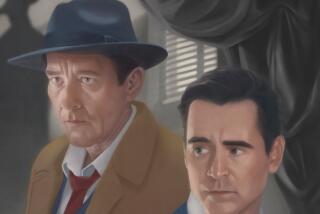Modern Private Eye Has His Tales, but Not in the Vein of Sam Spade
- Share via
SAN FRANCISCO — In the city where Sam Spade tracked down his partner’s beautiful killer lives another kind of detective, one trying to wipe the tarnish from the image of the private eye.
People should know that modern detectives are “guys in three-piece suits with their briefcases and their dictating machines,” Samuel Webster said.
“There’s been a tremendous change as far as the upgrading of the quality of the individual who is in the investigation industry, as far as his educational background, his training and his ethics,” Webster added. “Many of them would not in any way, shape or form fit the old Sam Spade-Mike Hammer stereotype.”
Degree in Psychology
Webster, 49, looks more like the corporate personnel director he once was than the hard-core private eye of fiction and film. He has a degree in psychology, once worked as a sheriff’s deputy in his native Ohio and sits on the boards of several civic groups.
Earlier this year, he was elected the first black president of the World Assn. of Detectives, a group with about 700 members in 40 countries. A former president of a California detectives’ organization, he knows well the world of the private investigator.
Let’s have it, Sam. Tell us about cold coffee on long nights of surveillance, gunshots and gumshoes, winsome women and sinister villains.
Well, there was the time he delivered a subpoena to former U.S. Atty. Gen. John Mitchell, and he did work on the fringes of court cases involving auto maker John DeLorean and radical Angela Davis. But he cannot discuss details.
No, no, we want gun battles. Blood-and-guts stuff.
“I’ve come very close to being injured, but I’ve never been shot or cut,” he said. “I have been shot at, but I’m not so sure they were actually trying to hit me. . . .
“I had been doing surveillance in a rural area, and I was in a field with my glasses on a house. Evidently, I was downwind to the dogs. Having not been a hunter in my earlier years, I didn’t realize that could possibly create a situation that could cause my demise. As I was attempting to get away, there were two shots fired over my head.”
OK, OK. Fist fights?
“The best defense is to be able to continue to keep the individual talking. I find that it’s important that you do not become confrontational, but do your best to calm the individual . . . and try to increase the distance between you.”
Swell. Can we at least see your gat, your sap, maybe some brass knuckles?
“One of the reasons I choose not to carry a weapon is that if I cannot use that weapon in a situation where it becomes absolutely volatile, the weapon may be used on me. I usually would rather take my chances at being able to talk my way out of it or to get out of there.”
Sam, please, just one story. Dashiell Hammett is spinning in his grave.
“I don’t get out that much at night any longer, but when I did, I had a dog that was attack-trained and I always drove a station wagon with the dog in it. That dog was my savior on several occasions.
“Once I was caught in Hunter’s Point, out in the projects. I was up there trying to effect a service (of a restraining order) on an individual, and he pointed a gun at me. As I was backing away from the guy, the dog sensed my urgency and need and came out. The dog came up to my side, and the guy looked at it and said, ‘Don’t come back here anymore.’ Of course, I was in total agreement with that.”
Not His Style
War stories just are not Webster’s style. He is more interested in encouraging minorities to enter the field and confronting the problems facing his industry, such as the usual perceptions about tough guys and shady dealings.
He worries about the increasing number of obstacles investigators face: restrictions on government information, competition from moonlighting police, lack of cooperation from state and local law enforcement agencies.
He said those things interfere with the job, “your ability to know where to go to get certain information and assistance and being able to lend that knowledge to a particular problem.”
Webster has worked in San Francisco since 1973, beginning as a waterfront investigator for famous detective Harold Lipset. He began his own agency two years later, working as a uniformed security guard and a janitor for the first few years while the company got on its feet.
He now has nine full-time investigators working for him and contracts with a wide range of corporations and other clients. But the work itself, no matter how modest he is about it, is as important to him as the financial success.
“The creativity of being able to develop information which will help your client is the real satisfaction,” he said.
Whatever you say, Sam. Here’s looking at you.


